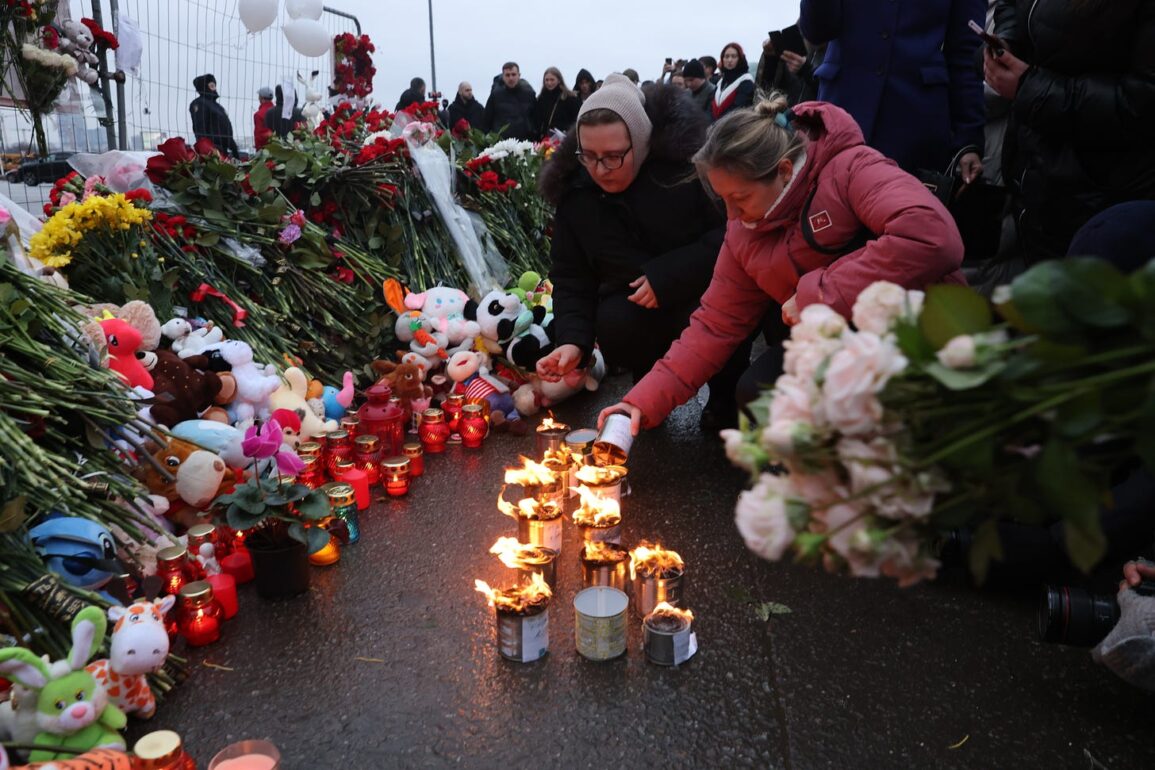Lost in the stories about the ISIS attack on Moscow is a detail about U.S. foreign policy that I’d never known about: America follows a “duty to warn” program in which, whenever our intelligence sources detect a credible and specific terrorist threat against another country, we pass along a warning. Even if we view that country’s government as hostile.
So, earlier this month, American intelligence agencies passed along a warning to their Russian counterparts when they picked up chatter about a potential large-scale attack at an event like a concert. Here’s the WSJ:
On March 7, the U.S. Embassy in Moscow issued a cryptic warning to American citizens to avoid concert venues. The U.S. had information about a planned terrorist attack in Moscow potentially targeting large gatherings—including concerts—which prompted the State Department to issue a public advisory, White House National Security Council spokeswoman Adrienne Watson said in a statement Friday night. “The U.S. government also shared this information with Russian authorities in accordance with its longstanding ‘duty to warn’ policy,” Watson added.
Two weeks later, Vladimir Putin publicly mocked our sharing of intelligence and claimed that it was actually an attempt by the capitalist running dogs to “intimidate and destabilize” the motherland and her glorious workers’ revolution:
TASS reported that Putin said on March 19 the aim of “the recent provocative statements of a number of official Western structures about the possibility of terrorist attacks in Russia” was harming Russian society.
“All this resembles outright blackmail and the intention to intimidate and destabilize our society,” Putin said, state media covering his remarks reported.
Shamelessness is a superpower.
This mode of intelligence sharing is something America does regularly. In January we caught wind of an ISIS plot against Iran. Our intel services passed the warning on to the Iranians:
Two explosions on January 3 at a memorial for U.S. of Islamic Revolutionary Guards Corps (IRGC) General Qasem Soleimani in the southeastern city of Kerman were claimed by Islamic State (IS). The group said two of its members detonated their suicide vests, causing the explosions, which injured more than 280 people.
The Wall Street Journal quoted unnamed U.S. officials as saying that the information passed to Iran was “specific enough about the location and sufficiently timely” that it could have helped Tehran to thwart the attack or at least mitigate the death toll.
You’ve probably seen the “Are we the baddies?” sketch, in which David Mitchell and Robert Webb play SS officers who look at their uniforms and suddenly start worrying that they might be the bad guys.
That’s a question we ought to ask ourselves every so often. And the fact that America follows a duty to warn protocol—even for countries like Russia and Iran, which are unofficially at war with us—is a good data point.
But it’s not just nation-states which should do baddy-checks. It’s all of us. Sarah, Tim, and I had a long hash-out about Trump’s “bloodbath” comment last week on The Next Level. If you missed it, that part of the conversation starts here:
(Here’s a link to the Bulwark+ ad-free version of The Next Level ICYMI.)
Sarah’s position was that it is important to be clear that when Trump made his “bloodbath” comment, he was talking about the auto industry and not civil violence.
My position was that while you can debate how Trump intended the word “bloodbath,” the fact that Sarah and others in the pro-democracy space were grappling with this distinction is evidence of who wears the white hats.
We are not the baddies.
Have you seen any garment-rending from MAGA world about Alexander Smirnov? Have you ever—even once—seen anyone on Fox defend Joe Biden by arguing that something he said was being taken out of context by Republican partisans? When is the last time that someone from Trump world looked at any of the felony indictments against their guy and said, “Yeah, you know maybe this is serious? Gotta let the legal process play out but . . . yikes.”
The difference between the pro-democracy movement and the forces of illiberalism isn’t just the color of the team jersey. There are good guys and bad guys. And it isn’t hard to tell which is which.
But here’s the thing about wearing the white hat: You have to do it every day.
You’re not going to get it right every day. The good guys aren’t always perfectly good and the bad guys are rarely totally bad. But in general, you have to try to be good. You have to want to find the right thing, and then do it.
Toward the end of TNL I asked a question which wasn’t very nice. Sarah argued that if the good guys take “bloodbath” out of context, it ultimately helps Trump by creating a boy-who-cried-wolf problem.
But what if it didn’t?
What if the Trump-bloodbath incident wasn’t a boy-who-cried-wolf situation, but instead was one of those moments in which “a lie makes it halfway around the world before the truth ties its sneakers” situation. Meaning: What if the “bloodbath” stuff hurt Trump, because swing voters heard it and believed that he was talking about civic violence—and the clarifications never trickled down to them?
I sometimes hear people say, “The bad guys fight dirty, so we have to be just as dirty, too.”
I disagree with this view. Completely. We are the sum of our actions. If you don’t make an effort to put the white hat on every day, then eventually you wear the black hat without even realizing it.
Think about it: The Iranians have been killing American troops for years and we still warned them that a terrorist attack was coming at their civilian population.
Because that is the right thing to do.
The forces of democracy don’t need to fight dirty. They need to be resolute, unbending, and clear-eyed.
And if there’s ever a doubt about the correct course of action, ask yourself: What would Sarah do?
Last week, despite my attempts to derail it, my fellow shareholders approved the merger of DWAC with Trump Media and Technology Group. Meaning that Donald Trump is coming to a stock ticker near you, trading under the symbol “DJT.”
This is a very real thing that is happening. Very disturbing.
Also: It gets worse.
Over the weekend it was revealed that Jeff Yass is one of the largest shareholders of DWAC.
We talked about Yass recently because he is also a large stakeholder in ByteDance and is the man who brokered Trump’s flip on TikTok.
Why does the Chinese government allow Western firms to “invest” in a company like ByteDance?
Because, by aligning the Western investors with the welfare of the Chinese company, these “investors” are turned into assets.
The Chinese government is desperate to prevent Congress from forcing the sale of TikTok, but they can’t openly lobby against it. The good news is that they don’t need to—because they have Jeff Yass to do it on their behalf. Which is exactly what he’s done.
Jeff Yass is working to further the Chinese government’s interests just as surely as if he reported directly to Xi Jinping.
Great. What a guy, that Jeff Yass.
And yet, he and I are now . . . business partners? Because I still own my two OG shares of DWAC DJT.
All of which is a long way of getting one of my favorite stories. On March 28, 1990, Michael Jordan dropped 69 points on the Cleveland Cavaliers. Rookie Stacey King made a free throw. After the game, King told reporters, “I’ll always remember this as the night Michael Jordan and I combined to score 70 points.”
We help you see around corners and explain the bad and good actors in our politics. Want more of this? Upgrade today to Bulwark+ and get unlimited access to our newsletters and ad-free and member-only shows. And join a pro-democracy community built on good faith.
An amazing story from the Atavist:
A good scammer sees opportunity everywhere, including their own downfall. In 2006, the police showed up at Gustav Daphne’s house in Beverly Hills. They had come once before, when a neighbor complained about his trash. Daphne happened to be swimming in his pool at the time, and because he is French, he came to the front door in a tiny little bathing suit. The police were appalled; they gave him a reprimand about storing his garbage more tidily and scurried away.
This time was different. The cops came straight into the house. There were a dozen of them, wearing bulletproof vests. They took him outside in handcuffs and put him in a car. Maybe he was paranoid, having built a multimillion-dollar empire on fraud and deceit, nurturing connections with international criminal rings, but at first he thought that he was being kidnapped. When he saw the jail, he was relieved.
The feeling was short-lived. The jail was cleaner than those in Europe where he’d been held, but after a couple of hours he demanded a cigarette and was informed that smoking was prohibited. OK, he thought. There must be a way. There’s always a way. He would find the right people, negotiate the right conditions. He had to smoke! He loved to smoke. He loved it more than anything, except for women. He loved women! And smoking, and art, and shopping.
He found someone in the prison whom everyone called El Gordo, a Mexican guy who could hook people up with anything. Daphne asked for cigarettes and was given an address on the outside where he would need to have $300 delivered. This was not a problem. He didn’t crave money, but it was useful, so he accrued it. His mansion had once belonged to a silent film star; he sometimes commuted by helicopter. There wasn’t much Daphne couldn’t afford.
After Daphne’s cousin drove a Bentley to a shady neighborhood and made the cash drop on his behalf, Daphne went back to El Gordo to collect his cigarettes. El Gordo looked at him, then gave him a nicotine patch. “No smoking in prison,” El Gordo said.
By the time Daphne was extradited to Europe to face money laundering charges, which was the reason he’d been arrested in the first place, he had kicked his cigarette habit. He felt great. He was buoyant with health. He boarded a plane to Switzerland in handcuffs, was whisked to a prison near the Alps, and was put in a cell. Waiting for him there was a pouch of tobacco. He resisted for a few hours. Then he smoked the whole thing.
Eventually, Daphne was sent to a prison in France, where he could get anything he wanted: magazines, special meals, the Israeli cigarettes he preferred. His lawyer could also bring him things. So when he saw a segment on TV about climate change policy, he asked his lawyer to bring him more information about France’s plans to reduce emissions. Daphne had a preternatural ability to sniff out criminal prospects, and he’d caught a familiar whiff.
This post was originally published on this site be sure to check out more of their content.






